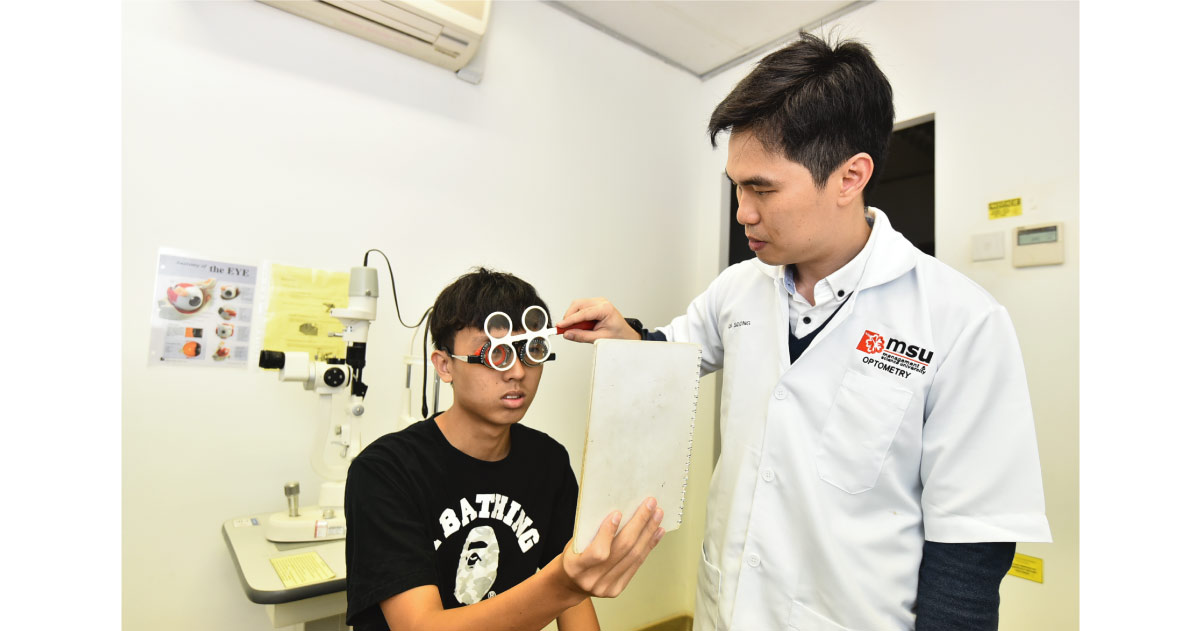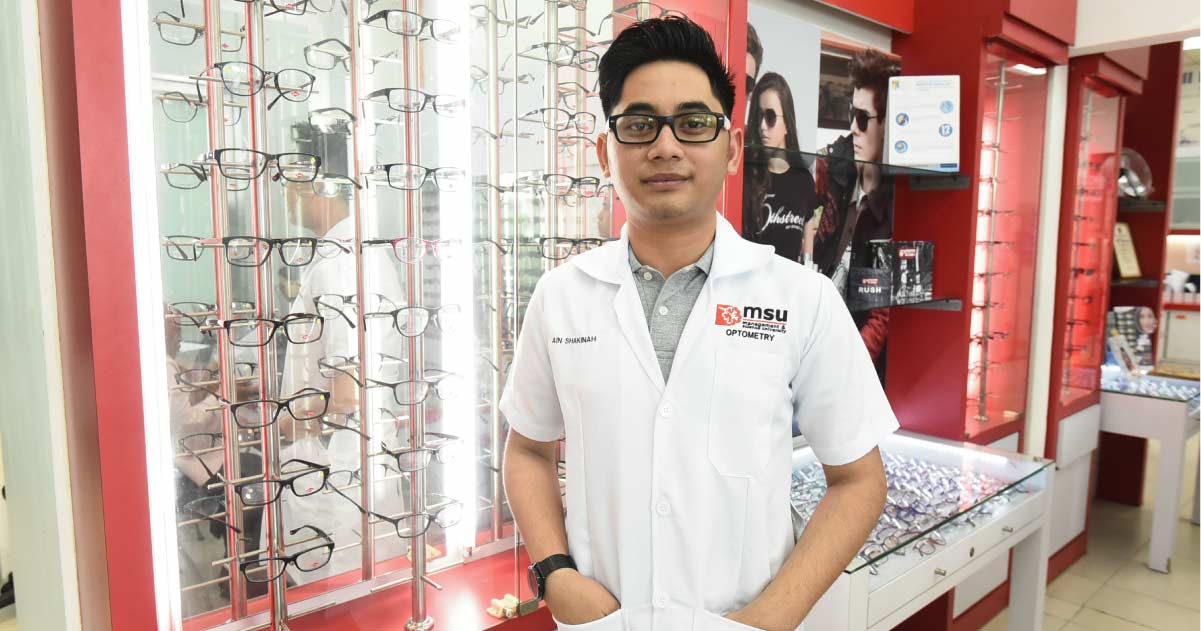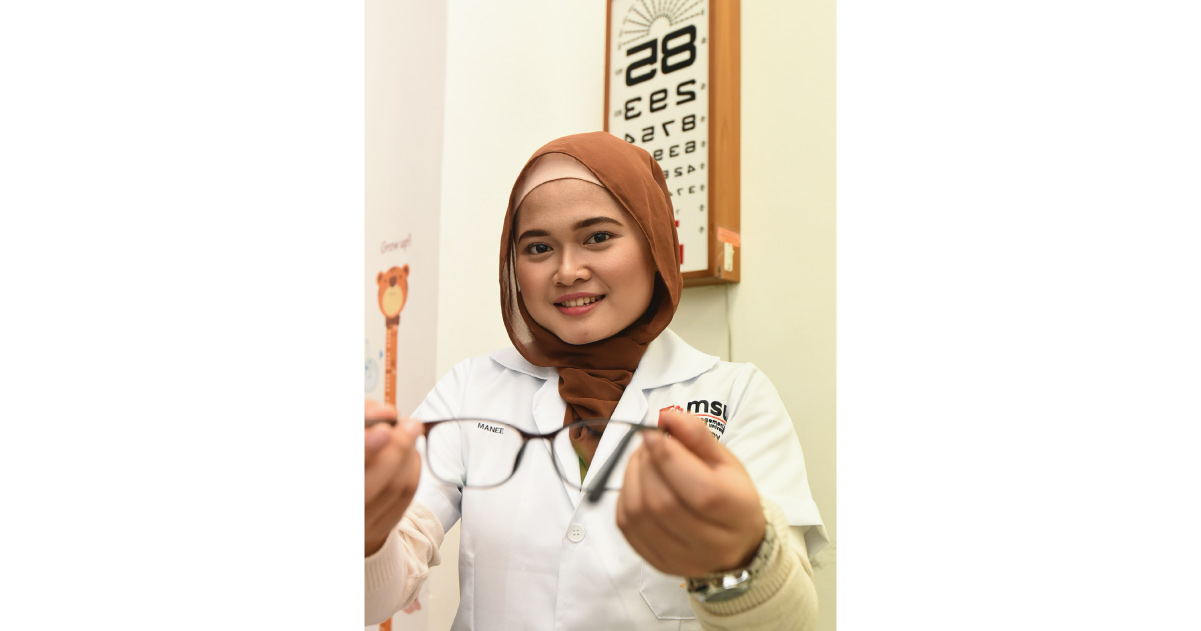

People say, seeing is believing. Out of the five senses we have, vision is the most important. Losing sight will mean a significant change in lifestyle and habits as one relearns how to orientate oneself. Maintaining good vision goes a long way towards success in life.
What is a comprehensive eye examination?
A comprehensive eye examination, which typically takes about half to an hour, begins with reviewing a patient’s ocular history. Similar to that of general medical history, ocular history taking can help ophthalmic diagnoses narrow down the cause of potential diseases, identify any necessary special attention or further investigation, and reveal symptoms that may need urgent referral to a specialist.
Tests then follow for visual acuity, pupil and muscle response, and depth of perception. Any defects in colour vision will also be screened, before the eye refraction is tested for short sightedness, long sightedness, astigmatism, and presbyopia (long-sightedness caused by the eye lens losing its elasticity owing to age). The patient’s binocular vision will next be tested for both eyes working together and for the eye muscle function, and the eye physiology is examined for its anterior (front) and posterior (back) health.

Why are annual eye examinations important?
Visual impairment from uncorrected refractive errors can have immediate and long-term consequences in children and adults, such as lost educational and employment opportunities, lost economic gain for individuals, families and societies, and impaired quality of life (WHO, 2014).
In this age of digitization and social media, increased exposure to digital devices most certainly will give rise to related problems such as myopia. Children nowadays, with their higher access, have a higher risk of developing myopia. Left uncorrected, it may affect their performance in school. In adults, the prevalence of eye strain or vision fatigue increases along with complaints of headaches, tearing, dry eyes, difficulties in focusing, etc., which may affect work productivity. Some may even experience the onset of presbyopia much earlier than the expected regular age range.
In the same vein, annual eye examinations help establish a baseline for preventive management. Permanent vision loss can be arrested in its tracks when the eye condition is monitored regularly, and “silent” cases such as glaucoma, macular degeneration, and cataract can be brought to light early.
Blindness prevention in MSU’s Eye Carnival
Is there a best time of day for eye examinations?
An eye examination depends on both subjective and objective responses from the patient, and variances are normal. However, having an eye examination after a long day, where your eyes had been staring at the computer screen all day long, resulting in dry eyes as well as vision fatigue, may influence your eye examination readings. Your blood sugar level is another influencing factor. Always inform your optometrist or optician about your medical condition and any prescription you are on, so they can advise you on the best time to have your eye examination.
Whom should we consult for primary eye care and where?

Ophthalmologists are eye specialists. They had gone to medical school before specializing in Ophthalmology. They can perform cataract surgery, LASIK and other corrective lasering, and injections to the eye. They can also prescribe medicines.
Optometrists are qualified, licensed practitioners able to determine your vision status and eye ability to function simultaneously. They do not perform any surgery. Their management of your eyes mostly concerns glasses, contact lenses, vision therapy, prescriptions of artificial tears, and planning out specific management regimes except surgical. In Malaysia, optometrists hold a green certificate and the APC from the Malaysia Optical Council. Their licence must also be renewed every year.
MSU Bachelor in Optometry (Honours)
In some countries, opticians mostly are the technicians, but in Malaysia we do have licensed opticians who can perform refraction and prescribe basic contact lenses.
MSU Diploma in Ophthalmic Dispensing
An eye examination can be done by all registered optometrists and opticians, though comprehensive primary eye care examinations are usually done by the optometrist. And most optometry schools have free or subsidized full eye examinations by students.

What kind of management can a patient expect from an optometrist?
There are optometrists who also specialize in pediatric, geriatric, contact lenses, low vision, and binocular vision. Specialists in making fake eyes are called ocularists.
Usually, optometry management consists of lens or contact lens prescription. Rehabilitation and treatment are also possible; for example, of a child with a need for bifocal/multifocal/hard contact lenses or lenticular lenses.
At MSU Eye Centre, one optometry specialization is Orthoptics (cases involving squints).
People say, seeing is believing. Out of the five senses we have, vision is the most important. Losing sight will mean a significant change in lifestyle and habits as one relearns how to orientate oneself. Maintaining good vision goes a long way towards success in life.
What is a comprehensive eye examination?
A comprehensive eye examination, which typically takes about half to an hour, begins with reviewing a patient’s ocular history. Similar to that of general medical history, ocular history taking can help ophthalmic diagnoses narrow down the cause of potential diseases, identify any necessary special attention or further investigation, and reveal symptoms that may need urgent referral to a specialist.
Tests then follow for visual acuity, pupil and muscle response, and depth of perception. Any defects in colour vision will also be screened, before the eye refraction is tested for short sightedness, long sightedness, astigmatism, and presbyopia (long-sightedness caused by the eye lens losing its elasticity owing to age). The patient’s binocular vision will next be tested for both eyes working together and for the eye muscle function, and the eye physiology is examined for its anterior (front) and posterior (back) health.

Why are annual eye examinations important?
Visual impairment from uncorrected refractive errors can have immediate and long-term consequences in children and adults, such as lost educational and employment opportunities, lost economic gain for individuals, families and societies, and impaired quality of life (WHO, 2014).
In this age of digitization and social media, increased exposure to digital devices most certainly will give rise to related problems such as myopia. Children nowadays, with their higher access, have a higher risk of developing myopia. Left uncorrected, it may affect their performance in school. In adults, the prevalence of eye strain or vision fatigue increases along with complaints of headaches, tearing, dry eyes, difficulties in focusing, etc., which may affect work productivity. Some may even experience the onset of presbyopia much earlier than the expected regular age range.
In the same vein, annual eye examinations help establish a baseline for preventive management. Permanent vision loss can be arrested in its tracks when the eye condition is monitored regularly, and “silent” cases such as glaucoma, macular degeneration, and cataract can be brought to light early.
Blindness prevention in MSU’s Eye Carnival
Is there a best time of day for eye examinations?
An eye examination depends on both subjective and objective responses from the patient, and variances are normal. However, having an eye examination after a long day, where your eyes had been staring at the computer screen all day long, resulting in dry eyes as well as vision fatigue, may influence your eye examination readings. Your blood sugar level is another influencing factor. Always inform your optometrist or optician about your medical condition and any prescription you are on, so they can advise you on the best time to have your eye examination.
Whom should we consult for primary eye care and where?

Ophthalmologists are eye specialists. They had gone to medical school before specializing in Ophthalmology. They can perform cataract surgery, LASIK and other corrective lasering, and injections to the eye. They can also prescribe medicines.
Optometrists are qualified, licensed practitioners able to determine your vision status and eye ability to function simultaneously. They do not perform any surgery. Their management of your eyes mostly concerns glasses, contact lenses, vision therapy, prescriptions of artificial tears, and planning out specific management regimes except surgical. In Malaysia, optometrists hold a green certificate and the APC from the Malaysia Optical Council. Their licence must also be renewed every year.
MSU Bachelor in Optometry (Honours)
In some countries, opticians mostly are the technicians, but in Malaysia we do have licensed opticians who can perform refraction and prescribe basic contact lenses.
MSU Diploma in Ophthalmic Dispensing
An eye examination can be done by all registered optometrists and opticians, though comprehensive primary eye care examinations are usually done by the optometrist. And most optometry schools have free or subsidized full eye examinations by students.

What kind of management can a patient expect from an optometrist?
There are optometrists who also specialize in pediatric, geriatric, contact lenses, low vision, and binocular vision. Specialists in making fake eyes are called ocularists.
Usually, optometry management consists of lens or contact lens prescription. Rehabilitation and treatment are also possible; for example, of a child with a need for bifocal/multifocal/hard contact lenses or lenticular lenses.
At MSU Eye Centre, one optometry specialization is Orthoptics (cases involving squints).